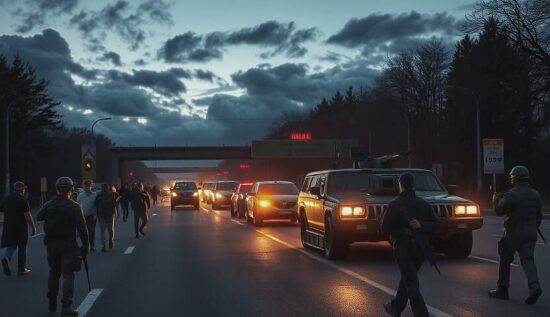The recent surge of documentaries in the public broadcasting system about the so-called Operation Plan Germany (see for example here, here, and here) might lead one to naively believe that this is merely a matter of informing the public about this affair, and not also a way to get the public accustomed to the idea of Germany as a NATO deployment area.
Operation Plan Germany is a secret document of the German military, reportedly consisting of over 1,000 pages in its first version, and according to the German military, it is about home defense, the protection of vital infrastructure, and national territorial defense in the dimensions of land, sea, air, space, and cyber and information space.
A particularly significant aspect, also in the public debate, is the “hub of Germany”, i.e., the role of the FRG as a NATO deployment area, before it heads east to defend the NATO’s eastern flank (“defense” from the perspective of NATO). As part of the Host Nation Support, Germany, due to its geostrategic location, is tasked with providing NATO troops during their deployment and ensuring their further transportation to the eastern flank.
To link military and civilian authorities (which in the event of a crisis would bear the main burden of the deployment) the German military has established a total of 16 state commands in the federal states. Since Operation Plan Germany is a secret document, one only learns small details from the media. But even these small information fragments give cause for alarm.
One of the latest publications in German television is an interview by BR24’s editor-in-chief Christian Nitzsche with the “father” of Operation Plan Germany, Generalleutnant André Bodemann. To manipulate the viewer into a warlike mindset, presenting a dangerous scenario of Russian aggression, and to win the sympathy of the public for the military (“General on the sofa”) has already been written about by Marcus Klöckner from NachDenkSeiten in a enlightening article.
One could almost consider the scene “General with heart and compass” (minute 18:17) as a special kind of absurdity, in which Bodemann tells a sentimental story from his Afghan deployment and shows off a gift from a US American comrade, a compass with a engraved phrase of poetry album quality. Of course, the Bundeswehr’s love for peace is also highlighted.
But this article is not about that. Already, Klöckner has noticed how Bodemann emphasizes that, from a formal legal perspective, Germany is not yet at war (not yet, one might almost add), but also no longer in peace. Klöckner interprets this as a means to build a sense of threat in the viewer (and that is indeed the case). But there is something else at play here, namely a legal fact.
There are exactly two places where one can infer that Bodemann might be revealing himself and not following his supposed goal of lulling the public, namely: first, according to Bodemann, the activation of the deployment plans is not necessary if there have not yet been battles in the Baltics (or elsewhere on the NATO-Russia border) that have been perceived as threatening by NATO. Bodemann claims that the deployment could be used as a deterrent against Russia even if only large, threatening NATO-manoeuvres were taking place on Russia’s western border, or if there were intelligence reports of a Russian deployment – for example, the relocation of blood packs (minute 2:31) to Russia’s border regions (that the Russians might relocate blood packs out of fear of an attack, this thought apparently did not occur to Generalleutnant Bodemann of the German Bundeswehr).
Second, Bodemann makes it clear that this deployment could take place while a purely legal state of peace still prevails in the FRG – i.e., without the Bundestag’s two-thirds majority having declared a state of emergency, which would trigger the notary law (with significant restrictions on the life of the citizens) – the next, sharper stage would be the state of defense. Bodemann is of the opinion that the NATO deployment to the east, which significantly affects the interests of German citizens, does not require the Bundestag’s consent. The decision-maker would then be the Chancellor, who would grant the corresponding NATO request. As if by Article 80a (3) GG? A provision tailored to the NATO and its claims on Germany. It is actually intended for the alliance’s fall (i.e., if a NATO member is attacked), but who knows? Maybe one would also use it for a deterrent deployment? The Bundestag could, of course, repeal these measures, but the hub of Germany would already be in motion – with all the consequences that would entail.





